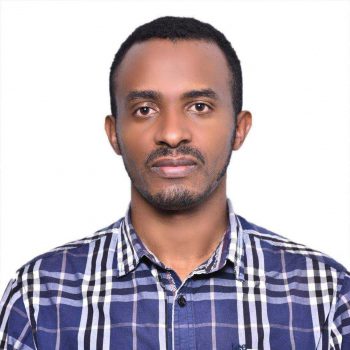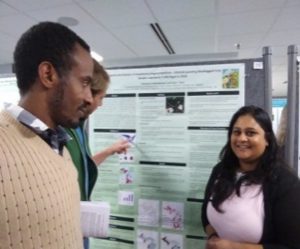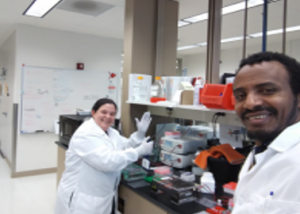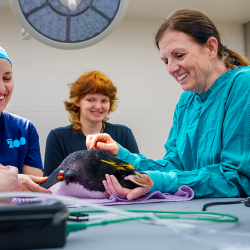In 2019, Dr. Tesfaheywet Zeryehun Shiferaw came to MSU as part of the USDA Foreign Animal Service Faculty Exchange Program. By this time, he had already earned his DVM from Addis Ababa University in Ethiopia, along with a master’s in Hematology and Clinical Pathology from University Putra Malaysia. Dr. Tesfaheywet was teaching at Haramaya University back in Ethiopia when he first learned of the USDA Program and recognized it as an opportunity to come to MSU and further develop his instructional, laboratory, and research skills. Since completing the program, Dr. Tesfaheywet was promoted to full professor in Veterinary Clinical Pathology at Haramaya University. This makes Dr. Tesfaheywet the youngest professor in the history of Haramaya University and the second full professor in the history of the Veterinary College of Haramaya University!

What drew you to veterinary medicine?
What actually drew me to veterinary medicine was my love for animals and the passion to pursue medicine. At first, I wanted to practice human medicine, but I came to realize that I am highly comfortable handling animals. My attachment to the pets in my family’s house and in the neighborhood strengthened my passion for the field. In addition to this, the two TV channels I used to watch (Animal Planet and National Geographic) attracted me to the field. While in vet school at Addis Ababa University, Ethiopia, I remember spending my time at the clinic and laboratories observing, assisting, and learning from my seniors before I even started my clinical courses.
What led you to study hematology?
My inclination towards pathology courses and veterinary clinical pathology back in vet school led me to later specialize in hematology and clinical pathology. My instructor for the veterinary pathology course, Professor Moges Woldemeskel, was iconic, and he made me fall in love with the course. His teaching method and ability to explain the “why” and “how” of diseases made me realize that veterinary pathology is the core discipline in understanding disease. Scientists even agree to call pathology the “hub of a wheel.”
So, I joined the faculty of Veterinary Medicine at the University Putra Malaysia to specialize in the field of hematology and clinical pathology. This field enhances diagnoses and paints a better picture when it comes to understanding notorious pathologies like cancer. Clinical pathology is also known as “laboratory medicine,” and as the name implies, it is an integral part of substantiating a diagnosis through laboratory investigations. Doing research by continuously trying to answer the “how” of disease, known as “pathogenesis,” really glued me to the field.
What did acceptance to the USDA Foreign Animal Service Faculty Exchange Program mean to you?

The Program is very well designed in that it is meant to transform the learning and teaching processes of universities in developing countries like ours (Ethiopia) through the transfer of knowledge and skill from a country like the United States, which is equipped with modern, digital, and scientifically high-rated technologies. The Faculty Exchange Program means everything to me for several reasons. For one, it helped me understand the learning-teaching curriculum. I really appreciated how teaching and research was integrated with the Veterinary Medical Center, the labs, and the farms. The Program also increased my capacity to participate in developing impactful research, and it provided a lot of opportunities for future collaboration and partnerships. Most importantly, the Program helped me gain laboratory techniques and skills that are easily transferable to my home university. Last, but not least, it helped me expand my understanding of American culture.
How much time did you spend at MSU?
I spent more than three months at MSU (September 8, 2019 – December 15, 2019).

How would you describe your experience at MSU?
I really enjoyed getting a taste for the course delivery, the instructional skills, and the quality of education rendered by the College. The interactive learning-teaching approach allows students to discuss and problem solve in group situations. I also received practical-oriented grant writing training from Dr. Kaneene, which significantly improved my grant writing skills and allowed me and other Program fellows to participate in an international grant challenge on rabies control in Ethiopia.
Phi Zeta Research Day at the College and the course “International Medicine” were the two most important events to me. They both helped me meet seasoned professors and learn from experienced faculty. I also got to learn about PCR-based molecular detection techniques for viruses at the Veterinary Diagnostic Laboratory at MSU.
Most importantly, my interpersonal communication skills have significantly improved following my interaction with professors, researchers, and students. I attended several events and tours, including the MSU Spartan Homecoming (and tailgate), a tour of the Detroit Zoo, and a visit to Lake Michigan. All of these gave me a better understanding of American culture.
Were there any especially meaningful faculty relationships you formed while at MSU?
My special relationship with my mentor Dr. Mike Scott has enabled me to extensively explore the MSU Hematology Laboratory and acquire some diagnostic skills. He also helped me obtain some case-based hematology slides, which I am now using to teach my students at my home institute.
What are you most looking forward to in your new position?
With the new position, I am expecting institutional support (national and international) to strengthen the practical education surrounding hematology and clinical pathology at the Veterinary College. My immediate task will be to work hand-in-hand with my administration to enhance the working capacity of our Clinical Pathology Laboratory. I am also finalizing a book, called Concise Practical Manual on Veterinary Hematology. The book will enable students to acquire practical skills on hematology techniques in a simplified manner. I expect the book to be released in a few months. Finally, I am encouraged by this achievement, and I am very much interested in further study or research collaborations with MSU or other American universities.
What do you like to do in your free time?
I like public/motivational speaking and enjoy talking to veterinary students and young community members in and around my university. I also enjoy writing short-form fiction and novels.



